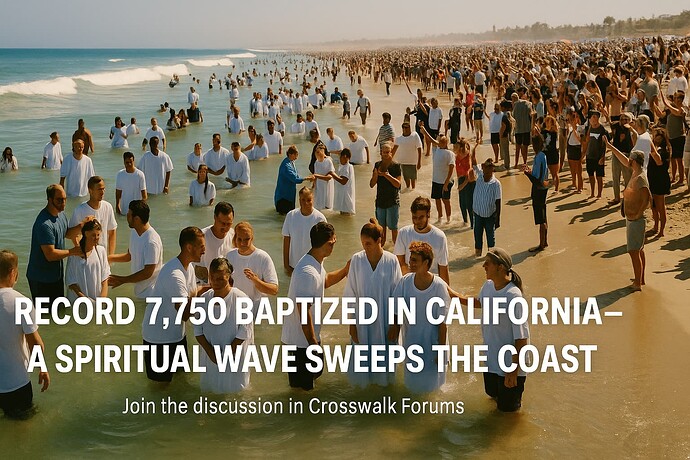I believe the article said that multiple churches syncronized to do this event. So one question I have is, does the number really indicate growing interest in being baptised? Or does it equal the normal numbers of multiple churches who have all gathered together in one place and time to do it.
Another question- how many baptised people were actually baptised for the first time verses being rebaptised? Were there a lot of backsliders who returned, or people who wanted to rededicate themselves to the Lord?
I think for many people it equates to a New Year’s resolution. They jump in because of fear, caused by current events and speculation. We live in a fear drenched culture at the moment. Fear, violence, lies, and chaos. And if anything is motivating Baptisms, it is that.
After the baptism, some may start attending church regularly. Some will participate. Some will even root in… But many will go back to their normal lives with no real change. Maybe watching and helping televangelists to raise money. And they will keep the Bible and God just close enough to be right, to bare some level of authority over others and behaviors they don’t like, but far enough away that they themselves don’t have to worry about their own need for change, growth, developement, inner healing. This is the most basic, human behavior when it comes to change. Feed the addictions, ignore the consequences, pretend that everything is fine.
On the surface, they have done all that’s required to be safe, as they have been told. But the transformation part comes from introspection, reading the Word, being in prayer, serving the Lord, listening to the Holy Spirit. Cleaning the inside of the cup. Removing barriers to love, healing the past, growing in faith. These take a lifetime of dedication. The transformation process is perpetual, at least in this life, because there are always ways to grow.
But most people are followers. Sheep. They just do what they are told. They are too afraid to go deep or question. So they look to a leader and hope he wont steer them wrong. Not a lot of possibility for change in that. Just.Militarization, and misdirection, by a Pastor’s lack of love. Or worse.
Personally, I said the salvation prayer a few times when I was a child and a teen. Out of fear of hell. But it did not lead to any change that I can recall until I was ready for that change in the Spring of 1994. I prayed for a Bible and a church in the same prayer, and God delivered. And in seeing God move, my faith was suddenly interactive. God was on the other end of the phone. You don’t turn your back on that.
Baptism for me came a few years later. At least 3 times. Assuming there was not a childhood experience way back. Lutheran, nondenominational Church of God, and Pentecostal. 3 different churches over a span of about 7 years. My second was a rededication because I had left the first church (not God or my Bible studies) and was absent for a year or two. My third… I honestly don’t recall the reasoning. I was still going regularly to other places. I was studying Christianity at the undergraduate level as a ministry major and attending services on campus. Maybe because it was Pentecostal and I just got swept up in the excitement?
My point is, baptism serves as a pronouncement, or a rite of passage. Lots of emotions, very symbolic. But transformational…? That comes from doing the real work, and having an actual relationship with God. And thinking for ones self.
God knows most people can’t do that, so He provides shepherds and warns of wolves in sheeps clothing. He warns the shepherd of the wolves because the sheep themselves are too helpless to save themselves. They don’t know any better. Hell, if they get spooked or excited they can run straight toward trouble, drowning in the waters or falling off the cliffs
Only good shepherds can guide a flock to safety. Holding them steady when dangers draw near, keeping them calm, guiding them wisely when it is safe to move. And like David, fighting off the devourers when they come. Even going in search of the lost, and taking as many sheep as they can from the mouths of wolves.
